Recap of Future Learning 2020 Summit 2015
Stanford H-STAR Institute, EdCast, Future Learning Lab and Zephyr Institute Convene Leaders in Learning to Share Ideas
From May 29-30, 2015 the Future Learning 2020 Summit was held on the Stanford University campus, in Palo Alto, CA. It was sponsored by the H-STAR Institute, a multidisciplinary institute at Stanford focused on people and technology, and co-sponsored by and EdCast, a provider of personal knowledge networks, Future Learning Lab, an international research network, and Zephyr Institute, a recently established think tank. Class Central attended the conference at the invitation of EdCast, and produced this report to summarize some of the topics discussed at the conference.
The hosts of the conference were Keith Devlin, Executive Director of the H-STAR Institute, Stanford University, and Oddgeir Tveiten, Professor at the University of Agder & NLA University College, Norway and Director of the Future Learning Lab. This was the fifth year of conference collaboration between the H-STAR Institute and Future Learning Lab.
Initial Kick-off of Summit
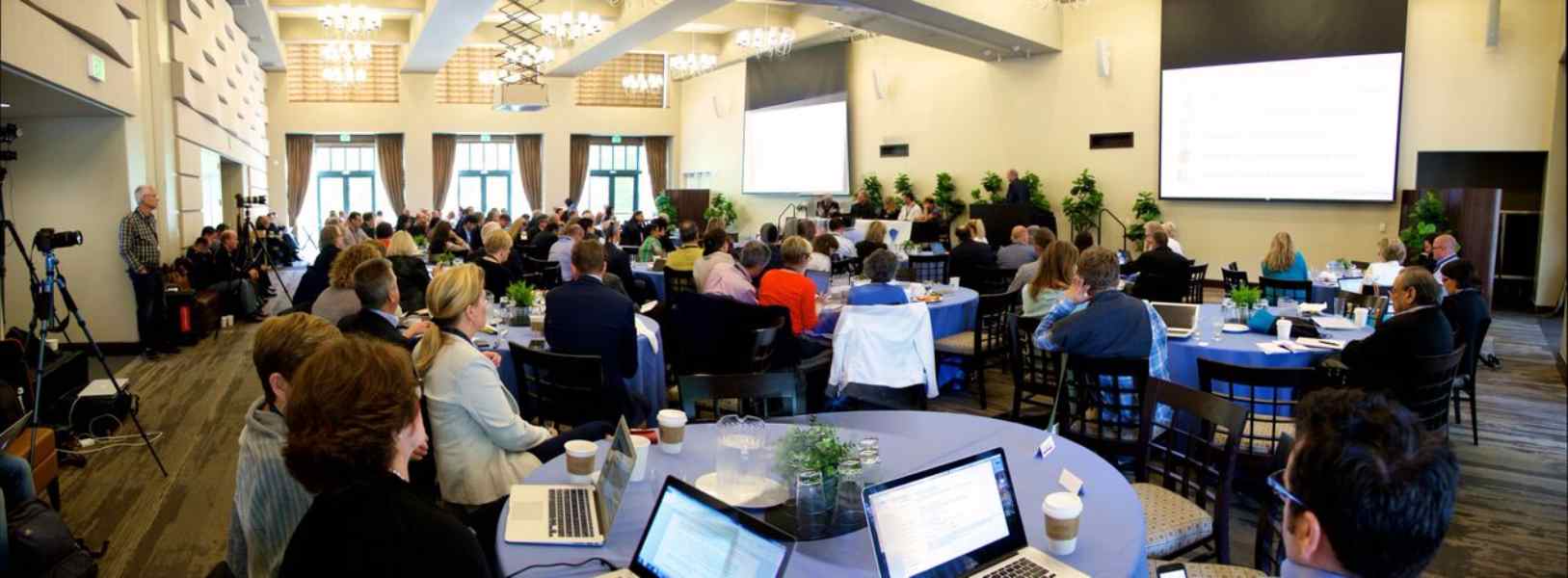
(Image: Courtesy of Future Learning 2020 Summit.)
To kick-off the summit, there were keynotes representing a spectrum of perspectives. From a university context, Prof. Shigeru Miyagawa, who was on the original faculty committee at MIT that recommended launching MIT Open Courseware in 2001 (which has reached a cumulative 175 million users since its inception) talked (the previous evening) about the modern incarnation of MOOCs following the same spirit of open courseware, in providing more access to higher education content. From a philanthropy context, Jason Palmer, Deputy Director of Postsecondary Education Success at the Bill & Melinda Gates Foundation talked about how MOOCs helped bring online and blended education to the forefront. One of his closing lines, which should haunt many university administrators’ dreams was “Online is the future; you need to find a way to make online core to your institution.”
You need to find a way to make online core to your institution
– Jason Palmer, Gates Foundation
From a government context, Susan Singer, Division Director for Undergraduate Education at the National Science Foundation (NSF) and a professor at Carleton College, talked about the importance of emphasizing noncognitive skills and called for better collaboration with what we know from the learning sciences in this regard, particularly regarding areas such as: learner motivation, prior knowledge, transferability of knowledge, and progressions. She mentioned that the NSF funded a MOOC on evidence based teaching in STEM. From a private organization standpoint, Scott Kinney, president of for-profit online Capella University talked (the previous evening) about their initiative to move beyond the credit hour and develop a competency-based education paradigm.
Panel on Higher Education
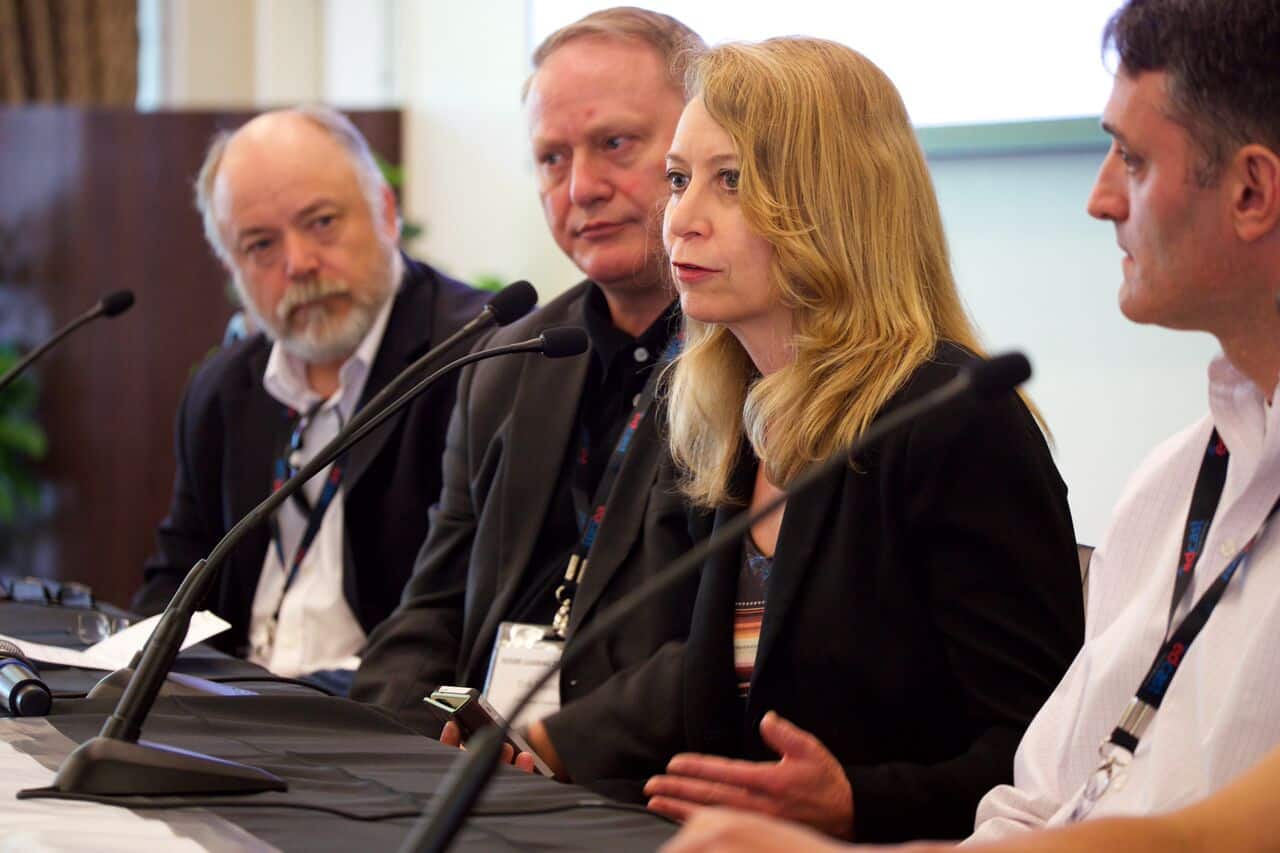
(Image:Adrian Sannier, Erik Nelson, Marti Hearst, Mark Haseltine (l-to-r); courtesy of Future Learning 2020 Summit.)
The higher education panelists were all on the cutting-edge of experimentation in higher education. Adrian Sannier, Chief Academic Technology Officer at ASU Online, talked about the recently announced Global Freshman Academy, a set of introductory college courses offered on edX for free, with the option of obtaining ASU credit at reduced tuition rates for those who pass–potentially up to a full freshman year. He pointed out that as ASU is experimenting with this, and along with other unique MOOC-based initiatives, the results will be visible for others to see (numbers and completions, etc.). Adrian waxed eloquently about the needs of universities to change and the power of technology to help enable new ways of operating. “This is no time for the faint of heart,” he declared, a statement that usually seems trite, but not in this case, from an an institution that is actually taking on bold initiatives.
This is no time for the faint of heart – Adrian Sannier, ASU Online
Erik Nelson, Associate Dean, Online Learning for Columbia University’s School of Continuing Education talked about the fact that administration and now faculty are on board with conducting online programs, and that the public has a strong appetite for them, but that the next key need he has is for online assessments that can accurately measure learning outcomes.
Prof. Marti Hearst, of the School of Information at the University of California at Berkeley, and co-founded the Learning@Scale conference (which focuses on research in large-scale learning, sponsored by the Association of Computing Machinery), discussed the importance of allowing educators the freedom to experiment with different teaching methods. Mark Haseltine, Chief Technology Officer of edX, represented the technical developer perspective, and wanted to understand the features that should be built that would enable next-generation pedagogy (a refreshingly humble change from the technogy-solutionism we so often).
The final panelist was Dr. Kenji Hakuta, professor at the Graduate School of Education at Stanford, and former Founding Dean at the new University of California, Merced. Prof. Hakuta started without departments, to try to prevent silos from forming, but found that even then faculty naturally aligned coalesced into their own disciplines. He had one of the memorable quotes of the conference: “You can’t herd cats…but you can move the food”. Incidentally, the panel discussion was deftly led by Matt Bowman, Associate Director of the Zephyr Institute and a co-founder of EdSurge. He not only had good questions and supplied smooth transition commentary, he did a great job in directing audience questions to the appropriate expert.
You can’t herd cats…but you can move the food – Dr. Kenji Hakuta
Lightning Round Talks
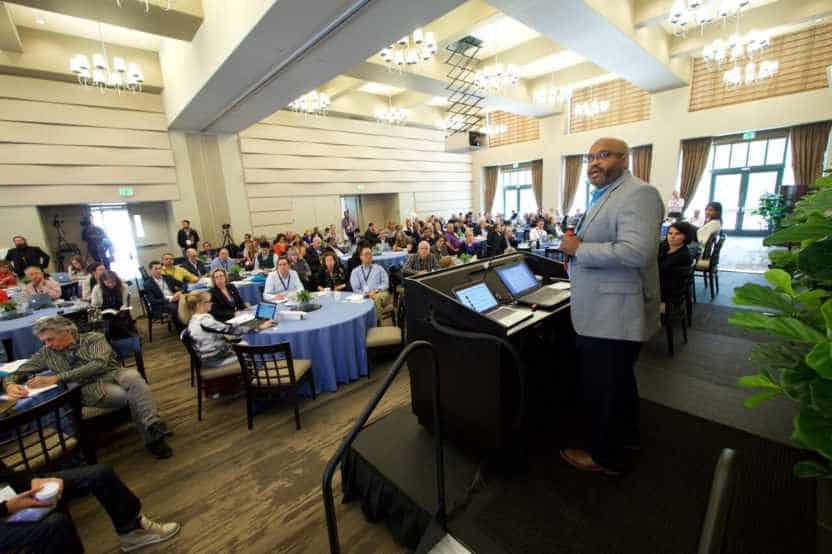
(Image: Rashad Muhhamad, Michigan State University; courtesy of Future Learning 2020 Summit.)
Next we had a series of quick talks from organizations pursuing new educational models leveraging the EdCast platform. Jacqueline Moen, VP of Online Education Platforms at the Smithsonian Institute described the museum’s mission in providing cultural experiences to the public beyond the walls of the museum. She described their online efforts, including Smithsonian.com (a social media hit with 4 million visitors a month) and three public MOOCs this year on teaching and popular culture, to reach a new level of engagement online. Chandrika Bahadur, of the Sustainable Development Solutions Network (SDSN), a United Nations initiative, talked about how they are building an online university, starting with a few online courses (and reported a 32% active engagement rate), and reported that it will be fully running by the end of next year.
The Smithsonian Institution is offering three public MOOCs this year
Rashad Muhhamad, an Instructional Technologist of Michigan State University (MSU) Global talked about the launch of a unique topical knowledge network, called the Food Knowledge Cloud, which will include resources such as MOOCs, webinars, and other forms of research dissemination. Finally, Molina Warty, Director of Strategic Initiatives at Cerego, a personalized learning platform company, described how adaptive content and review can increase course engagement and completion rates.
The Launch of EdCasting
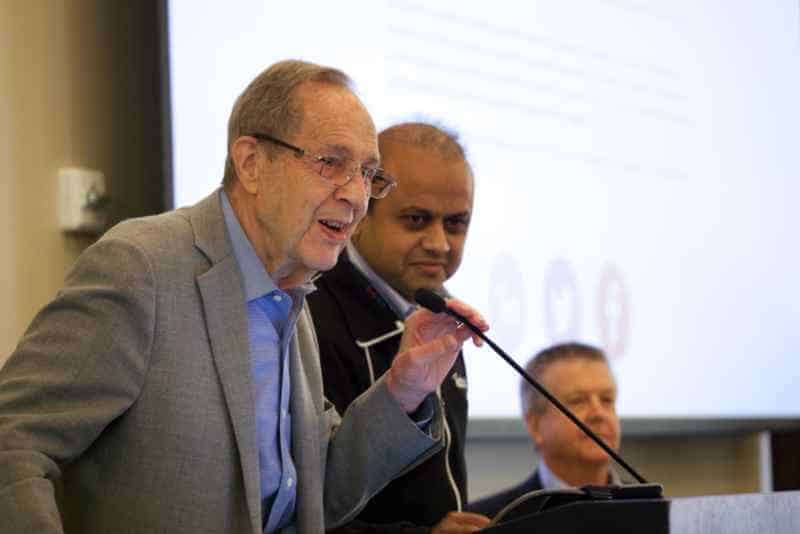
(Image: William Perry & Karl Mehta; courtesy of Future Learning 2020 Summit.)
Next up was the announcement of something referred to throughout the conference: the launch of EdCasting, introduced with Dr. William Perry, former Secretary of Defense, and head of the William J. Perry Project, a Stanford based initiative to educate the public on the dangers of nuclear weapons. Karl Mehta, EdCast CEO, also came on and introduced the rapper Divine (the official rapper for Andreesen Horowitz). EdCasting is the practice of curating and sharing links or videos that provide a stream of informal education content for your followers. Karl made the case that our learning shouldn’t be siloed according to universities, or other institutions, and that we need to link together both formal and informal education: “We need to turn education into a lifestyle.” With an informal online platform like this, you can start to see how the vision of seamless connections between informal and formal learning might be realized.
We need to turn education into a lifestyle – Karl Mehta, EdCast
The International Panel
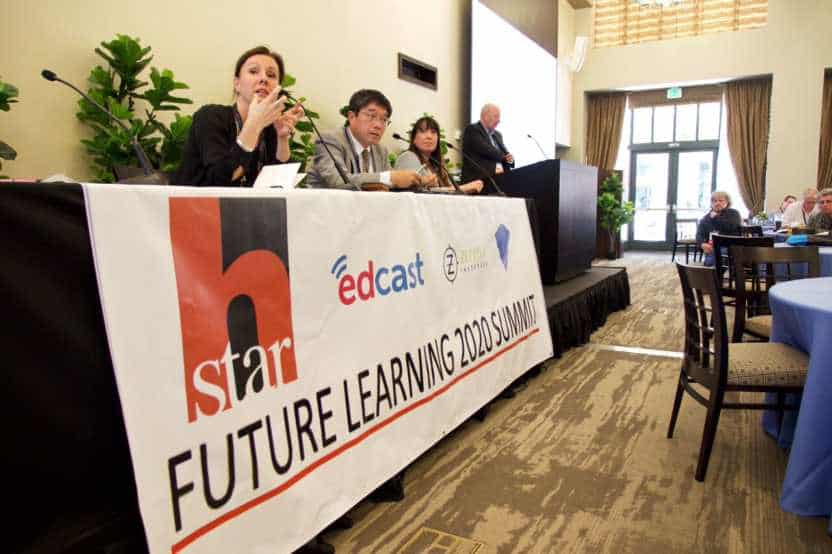
(Image: June Breivik, Haruo Takemura, and Donna Kidwell; courtesy of Future Learning 2020 Summit.)
Next up followed a panel focused on international education, moderated by Paul Bacsich of Sero Consulting in the UK. Donna Kidwell, President of Webstudent International AS, which helps universities engage with international students, discussed the sometimes drastic differences in online behavior across cultures, such as the level of participation in discussion boards, and the need for hyperlocal resources for certain types of education (for example, teach entrepreneurship). Prof. Haruo Takemura, President of the Japan Open Courseware Consortium, which was started in 2005 (at the request of Prof. Miyagawa from MIT, who we heard from the previous evening). The consortium has released 1800 courses since its inception (more than 80% in Japanese), content which Prof. Takemura hopes will be leveraged by others for courses, MOOCs, and other educational uses.
June Breivik, of the BI Norwegian Business School compared the mindset towards educational innovation she sees in Norway versus the U.S., with Norway too focused on research and policy statements (Norway is perhaps the only country with a formal government standpoint on MOOCs), and the U.S. too focused on technology-solutionism, and advocated for a middle ground. Michael Shanks, professor of Archaeology at Stanford (who looked like an erudite Michael Douglas) sounded a cautionary note that current efforts to spread education, though well-intentioned, might lead to greater inequality by keeping on-campus elite schools atop an ever-expanding educational caste hierarchy.
The U.S. is too focused on technology-solutionism, we should pursue a middle ground
Corporate Innovations in Learning
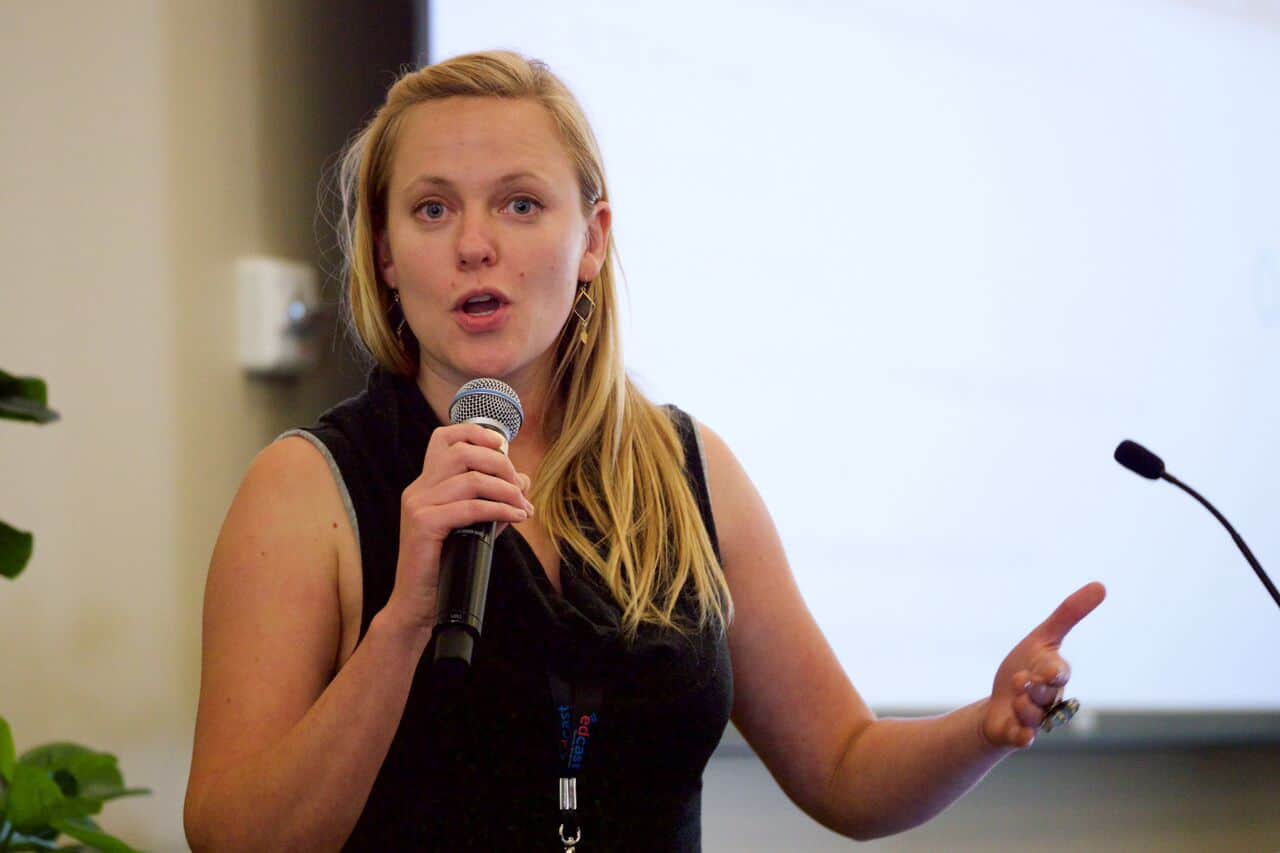
(Image: Masha Sedova; courtesy of Future Learning 2020 Summit.)
Then came a session for those in the corporate world, specifically, the learning and development environment. Martha Soehren, Chief Talent Development Officer of Comcast and her team described the internal training they developed for their employees—they found that no LMS vendors that could provide the mobile-based learning that they wanted, and so they developed their own. Masha Sedova, Director of Trust Engagement at SalesForce, discussed how online education is used to educate partners about security topics. It is important that this education enhances trust and authenticity, and she gave one low-cost example: when communicating a new security issue, SalesForce recorded an engineer with a GoPro camera on a stick as the engineer described the issue on the whiteboard of their office–a nice personalized feel that enhances trust, in what is a trust-based industry.
No LMS vendors could provide the mobile-based learning [Comcast] wanted
Rhonda Nicholson, Sr. Business Program Manager at Microsoft described the challenge their salespeople face as the company moves from a software to a SaaS and services company. She described the great success of their MOOC-based pilot training efforts among their sellers to teach the business skills that will help them thrive in the new environment, resulting in a certificate from Microsoft and INSEAD—the completion rate was 85%.
Conference Close
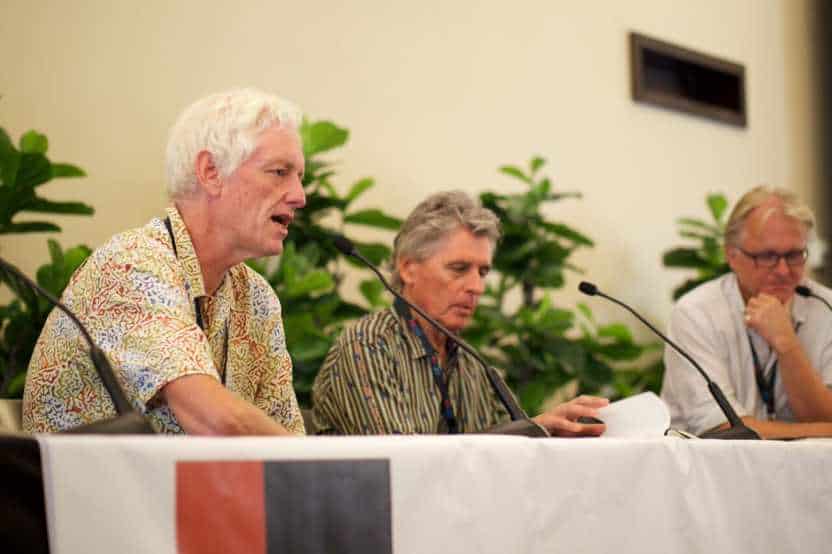
(Image: Peter Norvig, Keith Devlin, Oddgeir Tveiten; courtesy of Future Learning 2020 Summit.)
Finally, the conference closed with a couple of highlighted presentations. First Peter Corke, of Queensland University of Technology in Australia, talked about his experiences teaching robotics courses online, and his surprise that this topic would attract young kids and adult hobbyists from all over the world.
The closing discussion was a “fireside chat” (complete with a virtual fireplace in the background) with Keith Devlin (lead conference organizer), and Peter Norvig, Director of Research at Google, and co-teacher with Sebastian Thrun, of the first Stanford-based MOOC in 2001 on artificial intelligence. Keith had taken pages of notes throughout the summit and gave us some highlights from them. The summit provided a forum for experts steeped in different parts of the education ecosystem to share viewpoints. He shared that he is currently spending his time thinking about how to get people to bring mathematical thinking into their daily lives and work, and so was particularly interested in the corporate learning session, to see how industry views ongoing learning.
The summit provided a forum for experts…in different parts of the education ecosystem to share viewpoints
Peter Norvig talked about how things have changed since he co-taught the Artificial Intelligence MOOC with Sebastian Thrun. At that time, he had felt a burden that the world would need to see the potential that MOOCs offered, and was anxious that he would not be up to the task of carrying the banner. But now, four years later, based on the conversation at this Summit and elsewhere, he sees that people clearly understand the potential that online education can play in society.
Peter also pointed out the fact that motivation to learn is social. He noted that we have, and have always had knowledge and information around us, in the form of textbooks or the internet. “All the information is there, and we can learn it at any time” he says, “but we don’t.” And thus, it is institutions like schools, workplaces, social environments, or some hybrid like MOOCs, that get us actually focus on picking up knowledge.
All the information is there and we can learn it at any time, but we don’t – Peter Norvig
The summit ended on a positive note and the promise of a beautiful venue next year in southern Norway, to extend into a sixth year the collaboration between the H-STAR Institute and Future Learning Lab. All were invited to this ongoing conversation. This conference was unique–it’s one-day format meant that there was no multi-day session fatigue, or the large ballroom anonymity that you feel at other conferences. In spite of the jam-packed sessions, there were plenty of informal discussions and connections being made.
I myself had an interesting conversation with the president of an online university in Japan, who shared his successes and challenges in overseeing a new form of education that serves a specific, overlooked demographic, and shared ideas briefly with a philanthropist who funded a school to disappointing results but was still hopeful for better pedagogical approaches. And indeed, this was the point of the conference, to bring in people from these different areas, and discuss how we can collaborate to bring better innovations and improvements to education.





